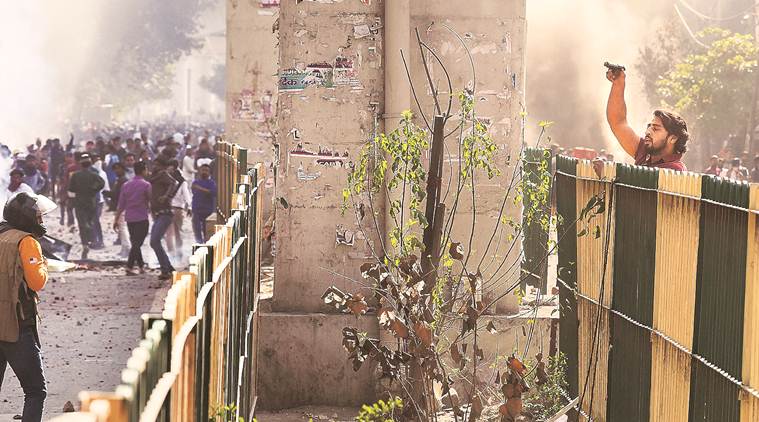 Shahrukh, a Maujpur resident, fired eight shots during Monday’s violence. He was detained. (Photo: PTI)
Shahrukh, a Maujpur resident, fired eight shots during Monday’s violence. He was detained. (Photo: PTI)
In the darkness of Monday night, Maujpur resident Kapil’s bright red ‘Make India Great Again’ cap stands out. He, along with several other locals, have taken it on themselves to man a stretch of road separating protesters from two communities.
“Our shops have been burnt. Public property was damaged and our locality has got a bad name. Is this the message we want to send out to the American President?” Kapil asked.
As evening turned to night, the Maujpur protest site, which saw violence that claimed five lives during the day, remained tense, with sporadic stone-pelting and the air smelling of smoke from burnt vehicles.
With the US President scheduled visit to Delhi, several platoons of armed policemen descended on to the area to keep the violence from spiralling outwards. Two fresh companies of armed policemen surrounded anti-CAA protesters, as a riot control van arrived carrying food supplies for the policemen, some of whom were finally having the first meal of the day — chapattis and dal.
Special Commissioner of Police (Law and Order) Satish Golcha arrived with a heavy force comprising personnel from the Rapid Action Force and Delhi Police around 9.20 pm and spoke to them for five minutes.
He then made his way to the anti-CAA protesters and told them, “There is a big event happening in Delhi. Our respect is on the line. Please maintain calm. We will also listen to you.” A protester shouted, “What about Kapil Mishra who is responsible for this?” Golcha replied, “ The Supreme Court is now listening to us. Sabka naam kharab hua hai.”
As Golcha left flashing a thumbs up sign, anti-CAA protesters formed a human chain around women, who reflected on the day’s violence. “They lobbed tear gas shells and chased the men. But the women have not shifted and we will stay here till the night ends,” said Shazma, as her five-year-old daughter slept in her arms.
In the unmanned stretch leading to the pro-CAA camp located at a local temple, residents looked for their belongings. A middle-aged man left his home looking for a bag he had dropped earlier in the day, only to be confronted by a large group of stick-wielding men and boys. A man carrying a hockey stick asked, “Hindu bhai ho?” The man nodded, and they let him pass.
Buildings set on fire continued to burn through the night as pro-CAA protesters carrying wooden sticks and baseball bats rushed towards the anti-CAA protesters, only to be met by a small crew of policemen, who smiled at them. “Aapki suraksha ke liye hai,” a policeman told the crowd, which soon dissipate after shouting some communally charged slogans.
At the temple, loudspeakers blared Hindi songs. As a 15-year-old boy wielding an iron stick thought of where to sleep for the night, another protester covered in bandages told him: “Jab tak ye nahi hatenge, kahin nahi jaana.”